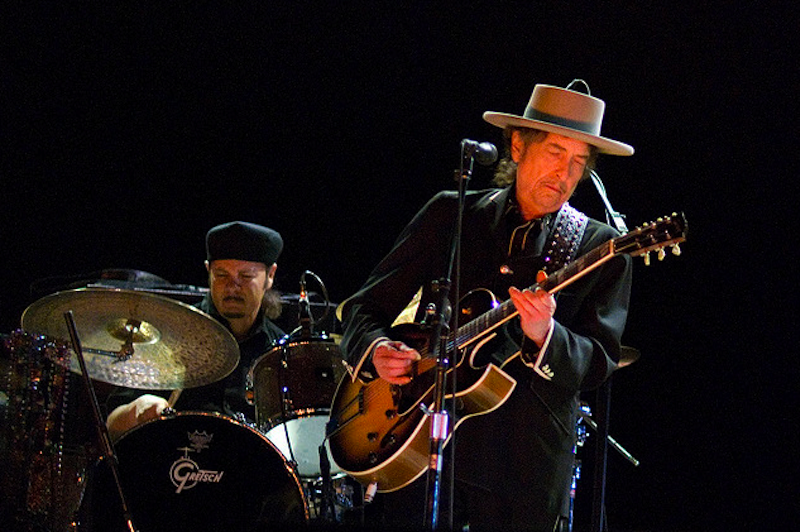The Wall Street Journal, whose opinions on pop culture usually rate somewhere between the Saturday Evening Post’s and your local high school’s newspaper, has actually caused a hubbub over the past few days, thanks to an article headlined “When to Leave the Stage.” According to its subhed: “Is it time for Bob Dylan to hang up his hat and harmonica?”
The reaction has been predictable. There are those who agree with writer John Jurgensen’s comparison of Dylan’s current singing voice to “a scatting Cookie Monster,” feeling he’s doing irreparable damage to his legacy by continuing to bray out the back catalog in practically any venue; others are outraged that anyone would dare question Dylan’s motives in revisiting, rearranging, and revamping what are, after all, his own tunes.
The speed with which the article has been condemned in many Bob-friendly quarters is impressive, but misses the fact that Jurgensen’s is actually a fairly well-balanced piece, taking into account both sides of the argument. That it’s accompanied by a typically unflattering Drew Friedman illustration—depicting Dylan in his underclothes, poolside at a retirement home sipping prune juice—doesn’t help, of course; neither does its sidebar on other aging musicians, which alongside Jerry Lee Lewis and Roger Waters includes, um, A Flock of Seagulls.
“Anybody with a trade can work as long as they want,” Jurgensen quotes Dylan saying in a 2009 Rolling Stone interview (not surprisingly, he wouldn’t talk with Jurgensen). “A welder, a carpenter, an electrician. They don’t necessarily need to retire. My music wasn’t made to take me one place to another so I can retire early.”
On the other side are a group of music critics and longstanding fans who are (or already have) given up on going to Dylan concerts. “I know every word to ‘Desolation Row’ but I couldn’t sing along,” complains one concertgoer. “What you’re used to feeling from his music just isn’t there.”
Of course, such sentiments echo the same sell-out accusations that have been dogging Dylan since at least 1965, when he “went electric,” much to the dismay of hard-core folkies. But for those who voice concern that Dylan’s murdering his legacy, University of Chicago economics professor David Galenson remarks: “Listen, this legacy stuff is a bunch of crap. That goes for Michael Jordan and Bob Dylan and economic professors: You’re known for your best work, not the bad work at the end of your career.”
Dylan’s done a lot of supposed damage to his career over the past decade or so, whether it’s been by appearing in a Victoria’s Secret ad, growing his infamous Vincent Price mustache, or releasing that fairly dumbfounding Christmas album last year. Yet Galenson’s right: None of those incidents—or his croaky concerts—are going to be what he’s remembered for. Will they be mentioned in his obituaries? Yes, but only after dozens of paragraphs about his artistry and impact.
This entire chapter brings to mind my own attitude towards the Rolling Stones some 25 years ago, sometime after Dirty Work had come along and failed to be the “next great Stones album” that everything since Exile on Main St. (or Some Girls, or Tattoo You) was supposed to be. Why don’t they give it up? I wondered.
Then I started going to their concerts, and saw just how much joy they could bring to generations of fans and, so it at least seemed, to themselves, something that doesn’t come through on such flaccid tour souvenirs as Flashpoint and No Security. I came to understand that, as Keith Richards puts it, just because nobody’s rocked out at age 60+ before doesn’t mean nobody ever should. The Stones’ forebears like Muddy Waters and Buddy Guy did it, as did such Dylan influences as Woody Guthrie, Pete Seeger and Leadbelly. Who am I to deny these guys’ methods of earning a buck—or several hundred million?
Meanwhile, Mick Jagger was the subject of a profile in Sunday’s T magazine, the New York Times’ fashion-focused publication. It’s more risible than the WSJ piece by half. Writer Zoe Heller marvels that not only does Jagger produce movies and enjoy cricket, but he also “reads widely in fiction and nonfiction.” Huh?
The best line, however, belongs to Jagger himself: “I think it’s really quite tedious raking over the past. Mostly, people only do it for the money.”
He was talking about Richards’ autobiography Life, but it made me reconsider my “live and let live” attitude toward the Stones. For somebody who sings “Satisfaction,” “Jumpin’ Jack Flash,” and a couple of dozen other oldies at every concert he gives—and who famously helped his band take in $558 million on its last tour—to make such a statement reveals Jagger to be the egomaniacal hypocrite that he’s usually portrayed as.
What to do about any of this? Stop buying the albums and concert tickets, I suppose.
How Does It Feel?
More on Dylan's suggested retirement.

JohnnysMedicine1
